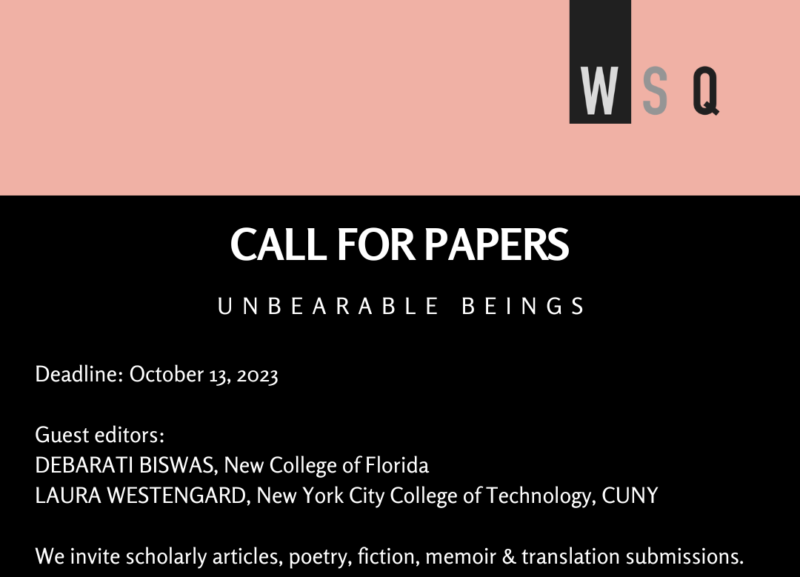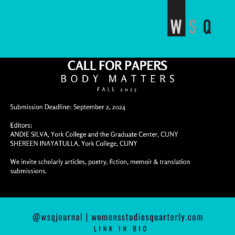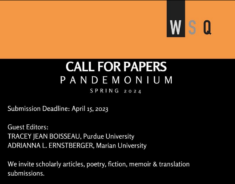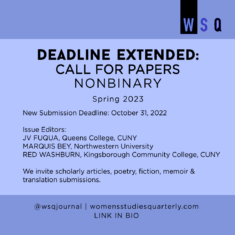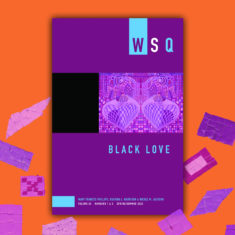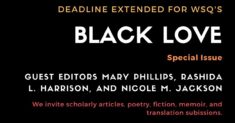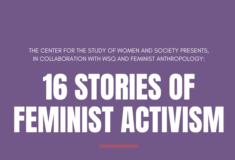About this call for papers
As a partner of Women Studies Quarterly (WSQ), the Center for the Humanities is excited to share this call for papers for a special WSQ issue Unbearble Being(s) which will be co-edited by Debarati Biswas (New College of Florida), and Laura Westengard, (New York City College of Technology, CUNY ), in collaboration with WSQ's publisher The Feminist Press and fellow partner The Center for the Study of Women and Society at the CUNY Graduate Center.
Priority Deadline: October 13, 2023
This special issue of Women’s Studies Quarterly invites submissions that explore the literary, theoretical, and cultural lifeworlds created by and about unbearable being(s).
“Unbearable being(s)” functions on multiple valences. “Unbearable being” is an affective state of being and becoming that indexes the intolerableness of existence within the normative. On the other hand, “unbearable beings” are the subjects who inhabit abject and/or revolutionary positions in relation to the sociopolitical apparatus and offer alternate possibilities of living and being in this world.
This special issue explores the unbearableness of that which cannot be contained within the category of what Sylvia Wynter defines as the “Man-as-human.” Infrastructures of oppression—the nation-state and its borders, citizenship, the unequal distribution of material resources deemed essential for survival such as healthcare, housing, education, and other human rights—police the borders of the category of the “Man-as-human” and cast out Black, Indigenous, people of color, impoverished, disabled, and LGBTQIA+ people differently. The COVID-19 pandemic and accelerating climate change have further dismantled the fictions of liberal humanism and laid bare the exploitative and extractive designs of capitalist white supremacy that create the category of “Man-as-human.” Treated as the refuse of urban renewal and gentrification, and/or displaced by environmental crises, wars, and ongoing legacies of settler colonialism and capitalist exploitation, marginalized subjects have, however, effected enormous sociopolitical changes over time, and have fostered socialities in spaces deemed unhomely and unclean. Such abject spaces include prisons, hospitals, segregated housing projects, war-torn zones, disaster sites, nightclubs, single room occupancy hotels, digital spaces, and other similar sites.
There have been a growing number of studies published on abject socialities and aesthetics in the fields of affect, feminist, queer/trans, environmental, and disability studies and their intersections with Black, Indigenous, and ethnic studies. Examples include José Esteban Muñoz’s Disidentifications (University of Minnesota Press, 1999), Katherine McKittrick’s Demonic Grounds (University of Minnesota Press, 2006), Darieck Scott’s Extravagant Abjection (New York University Press, 2010), Alison Kafer’s Feminist, Queer, Crip (Indiana University Press, 2013), Lauren Berlant and Lee Edelman’s Sex, or the Unbearable (Duke University Press, 2014), Alexander G. Weheliye’s Habeas Viscus(Duke University Press, 2014), Donna J. Haraway’s Staying with the Trouble (Duke University Press, 2016), and C. Riley Snorton’s Black on Both Sides (University of Minnesota Press, 2017). Building on this existing scholarship, we seek submissions that focus specifically on cultural expressions produced in abject spaces within various nation-states both in the Global North and Global South. We are interested in submissions that explore abject spaces shaped by white settler colonial domestic/international policies and multinational corporations. More specifically, submissions should explore how these cultural expressions push against/embrace/reject the unbearableness of being(s) and offer unknown possibilities of our freedom and creativity as a species.
LIST OF POSSIBLE TOPICS:
The unbearable and Black, affect, feminist, queer, and disability studies
Cyborg studies, animal studies, posthumanism, and the concept of “Man-as-human
Horror and the unbearable
Speculative/weird/climate fictions and possibilities of being and becoming
The “praxis of being human” in spaces marked by confinement, regulation, and surveillance
Representations of Black, queer, and other marginalized socialities in spaces of exception, such as nightclubs, cruising grounds, hospitals, prisons, and other carceral spaces
Possibilities of joy, pleasure, and resistance in spaces of tumult
Unhomely and unclean spaces and the possibilities of communities, intimacies, and mutual aid
Unbearableness of the settler colonial nation-state
Medical racism and homophobia/transphobia
Community building though disability and chronic illness
Radical care practices
Criminalization of unbearable being(s)
We welcome contributions that examine a wide array of literary and popular texts, films, performance, music, and other artistic expressions by and about marginalized “humans” who engage with histories of negative inheritances. Especially encouraged to submit are scholars, artists, creative writers, and activists who themselves experience various forms of marginalization within nation-states in the Global North and Global South.
Submissions Guidelines
Priority Deadline: October 13, 2023
- Scholarly articles should be submitted to WSQ.submittable.com. Please send complete articles, not abstracts. Please remove all identifying information from the file uploaded to Submittable. We will give priority consideration to submissions received by October 13, 2023. LGBTQIA+, disabled, Black, Indigenous, and people of color are especially encouraged to submit.
- Submissions should not exceed 6,000 words (including un-embedded notes and works cited) and should comply with the formatting guidelines at https://www.feministpress.org/... . For questions, please email the guest issue editors at [email protected].
- Poetry submissions related to the issue theme should be submitted to WSQ.submittable.com. Please review previous issues of WSQ to see what type of submissions we prefer before submitting poems. Please note that poetry submissions may be held for six months or longer. Simultaneous submissions are acceptable if the poetry editor is notified immediately of acceptance elsewhere. We do not accept work that has been previously published. For questions related to poetry submissions, please email the WSQ’s poetry editor at [email protected].
- Fiction, essay, memoir, and translation submissions related to the issue theme between 2,000 and 2,500 words should be submitted to WSQ.submittable.com. Please review previous issues of WSQ to see what type of submissions we prefer before submitting prose. Please note that prose submissions may be held for six months or longer. Simultaneous submissions are acceptable if the prose editor is notified immediately of acceptance elsewhere. We do not accept work that has been previously published. For questions related to creative prose submissions, please email [email protected].
ABOUT WSQ: Since 1972, WSQ has been an interdisciplinary forum for the exchange
of emerging perspectives on women, gender, and sexuality. Its
peer-reviewed interdisciplinary thematic issues focus on such topics as Asian Diasporas, Protest, Beauty, Precarious Work, At Sea, Solidarity, Queer Methods, Activisms, The Global and the Intimate, Trans-, The Sexual Body, and Mother,
combining legal, queer, cultural, technological, and historical work to
present the most exciting new scholarship, fiction, creative
nonfiction, poetry, book reviews, and visual arts on ideas that engage
popular and academic readers alike. WSQ is edited by Red
Washburn (Kingsborough Community College, CUNY), ABOUT WSQ: Since 1972,
WSQ has been an interdisciplinary forum for the exchange of emerging
perspectives on women, gender, and sexuality. Its peer-reviewed
interdisciplinary thematic issues focus on such topics as Asian
Diasporas, Protest, Beauty, Precarious Work, At Sea, Solidarity, Queer
Methods, Activisms, The Global and the Intimate, Trans-, The Sexual
Body, and Mother, combining legal, queer, cultural, technological, and
historical work to present the most exciting new scholarship, fiction,
creative nonfiction, poetry, book reviews, and visual arts on ideas that
engage popular and academic readers alike. WSQ is edited by Red Washburn (Kingsborough Community College, CUNY), Dána-Ain Davis (The Graduate Center, CUNY) and Kendra Sullivan
(Center for the Humanities, CUNY) and published by the Feminist Press
at the City University of New York. Visit
http://www.feministpress.org/w... published by the Feminist Press at
the City University of New York.
